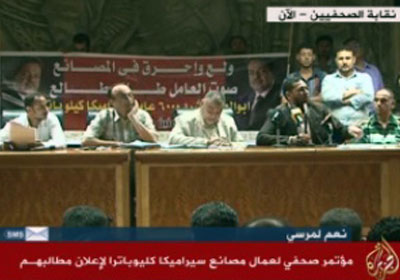
AFP File Photo
Interim Prime Minister Hazem El-Beblawi’s cabinet reviewed on Thursday its preparations for the upcoming constitutional referendum, due to be held next Tuesday and Wednesday.
In a press conference held after the cabinet’s meeting on Thursday, interim Minister of Interior Mohamed Ibrahim said the ministry has developed an “intensive plan”, in collaboration with the armed forces, to secure polling stations nationwide.
The security measures would encompass the voters, the judges and employees overseeing the voting process, members of civil society organisations monitoring the polling process and domestic and foreign journalists covering it, an official cabinet statement read.
Ibrahim warned that any attempt to “stall the referendum or prevent citizens from casting their votes would be handled with unprecedented force and firmness”. He promised that the two-day referendum would run smoothly and safely and called on citizens to participate in the referendum, adding that it would “launch Egypt as a civilian, democratic state”.
The minister accused the Muslim Brotherhood organisation, listed by the cabinet as a terrorist organisation two weeks ago, of trying to abort the referendum by scaring the citizens away from participating in the voting process.
“After the referendum, we will have firm legal confrontations with [the Brotherhood] which should bring back calm [to Egypt’s streets],” Ibrahim said, adding that the success of the referendum would be a “strong blow” to the Brotherhood.
The cabinet said it was taking the necessary measures to allow citizens to vote in polling stations different from those designated to them as per their ID cards.
Interim President Adly Mansour issued a presidential decree on Monday, amending the law on the right to political participation. The amendment was made to the provisions of Law No. 73 for the year 1956, allowing people living outside their governorates to vote in polling stations outside of their electoral districts.
Ibrahim said the cabinet would provide harsher punishments for those who abuse the newly issued decree by voting twice, “lest the Brotherhood use it as an excuse to claim that vote-rigging occurred.”
Nabil Fahmy, interim Minister of Foreign Affairs, submitted to the cabinet a report on the voting process by Egyptian expatriates thus far. On Wednesday morning, polls opened for the more than 681,000 Egyptians living abroad in 161 countries to vote on the constitution. Voting for expatriates is to resume until Sunday.
The draft constitution has been scrutinised by international human rights watchdog Amnesty International, which said that the text falls short of Egypt’s international human rights obligations despite fixing some deficiencies in the 2012 constitution. Other domestic civil society organisations have also criticised the text.

